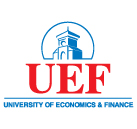Academic Seminar: "Rationality and irrationality in forecasting the Russian-Ukrainian conflict"
In order to help students update and analyze the international current situation from a multi-dimensional perspective and create opportunities for lecturers and students of the International Relations major to meet and exchange academically, the Faculty of International Relations of UEF held a Scientific Seminar: "Rationality and irrationality in forecasting the Russian-Ukrainian conflict" at 14:00, Monday, April 4, 2022 at classroom A. 10-06 – Campus 141 - University of Economics and Finance Ho Chi Minh City.
.jpg)
.jpg)
The event had the participation of Dr. Tran Thanh Huyen, Dean, Faculty of International Relations, Dr. Dao Minh Hong, Vice Dean, Faculty of International Relations, guest speaker is Mr. NGO Di Lan, PhD student, majoring in International Relations, Brandeis University, USA. The seminar attracted a lot of attention from lecturers, graduate students, students (from 2nd year and above) of international relations majors of universities in the south such as University of Economics - Finance Ho Chi Minh City, University of Social Sciences and Humanities, Vietnam National University Ho Chi Minh City, Hong Bang International University, Ho Chi Minh City Pedagogical University, HUFLIT.
The opening was a welcome speech by Dr. Tran Thanh Huyen, Dean, Faculty of International Relations. Ms. Huyen shared that the seminar "Rationality and irrationality in forecasting the Russian-Ukrainian conflict" is one of the events in the Faculty's academic webinar series around this topical topic. Besides, on behalf of the UEF Faculty of International Relations, Dr. Tran Thanh Huyen sent her sincere thanks with a small gift to Mr. Ngo Di Lan for taking time to share his perspective and views on the Russia-Ukraine conflict with Professors and students and students of international relations of universities in the South.
.jpg)
.jpg)
Through three typical historical events of the world, Hitler declared war on the US after the attack on Pearl Harbor, the Falkland War between Argentina and Britain, and the US overthrew the government of Saddam Hussein with the demand that they must leave Iraq or face war, the speaker emphasized the difference between rational and irrational in International Relations. According to Mr. Lan, clearly defining the goals to be pursued, weighing the pros and cons of possible options, prioritizing them, and making the most profitable decisions are considered signs of reason. In contrast, irrationality is the act of threatening one's own interests, preventing oneself from achieving the set goals, and letting emotions guide actions.
Next, Mr. Ngo Di Lan explained to the students the concept of bias,known as the psychological blind spot. He emphasized that, when an event occurs, people tend to focus on data-related facts, attention-grabbing sentences, descriptive adjectives, highlighting personal information and accept the thoughts and opinions of the majority. Besides, he also said that it is very difficult for people to change their thoughts and views on problems. Through a careful analysis of the concept of bias, the speaker emphasized that people always tend to filter opposing opinions.
.jpg)
.jpg)
.jpg)
To analyze the rationality of the forecasts surrounding the Russia-Ukraine war, Mr. Lan posed the question: What are the characteristics of the forecasts before February 24? Firstly, the forecasts are based on the rational thinking of the Russian leader - Mr. Putin. However, this trait will bring many dangers because it is completely based on the personality traits of the country's leader. Second, a lot of false predictions revolve around this war. Thereby, Mr. Lan introduced a new term "Superforecaster”. Those who know how to choose forecast questions of moderate difficulty, use a rich source of data from a variety of sources on both sides of the aisle, are able to make reasonable assumptions and estimate accuracy. Especially, the super forecasters will be the ones to make the most accurate forecast possible (e.g. 47% will happen,...) and be proactive in updating their forecast every time new information appears.
So, in order to make accurate forecasts, Mr. Lan has recommended to students the following 5 important things in International Relations: Remind yourself that people are not fully rational, including yourself; using the widest variety of information sources in the analysis by reading - asking the question “why do people think that way?”; willing to update when there is the latest information, especially the opposite trend; ask yourself the question “when will my forecast be wrong?”; must get in the habit of storing forecast results and performing analysis, reviewing what has happened against the forecast.
.jpg)
.jpg)
Finally, there is the sharing and exchange between Mr. Ngo Di Lan and the attendees. In this part, Dr. Dao Minh Hong shared about the fact that Dr. Tran Thanh Huyen and Dr. Dao Minh Hong are the ones who have accurate forecasts about the escalation between Russia and Ukraine. Ms. Hong said that accessing information from Russian sources has brought a lot of useful information in the forecasting process. Besides, based on the teaching experience and professional knowledge of the Dean of the Faculty, it is extremely necessary for the world to change the way it operates since Woodrow Wilson's 14-point Declaration was born. More specifically, it is to change the operating principle of allies.
The talk brought a lot of useful and new knowledge as well as opportunities for academic exchanges between lecturers, graduate students and international relations students. Forecasting is an important job of International Relations students in general as well as researchers and diplomats in general, so the content of the seminar is extremely practical.
News: FIR-UEF











